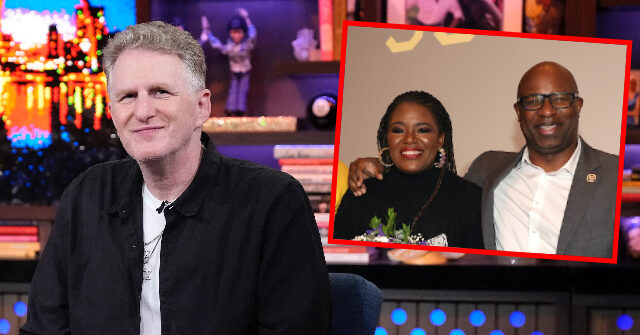Hollywood actor Michael Rapaport, known for his strong support of Israel, recently criticized outgoing congressman Jamaal Bowman for advocating “Free Palestine” during his farewell speech. Rapaport’s animosity toward Bowman and other members of Congress, referred to as the “squad,” stems from their apparent alignment with Hamas in the ongoing Israel-Palestine conflict. Following Bowman’s speech, Rapaport took to X (formerly Twitter) to challenge Bowman and fellow Democrat Cori Bush, suggesting they should visit the West Bank to gain firsthand understanding of the situation. Rapaport offered to cover their travel expenses and provide a daily stipend during their stay.
Rapaport, who is of Jewish descent, has been vocal about the ongoing hostage crisis following the Hamas attacks on October 7, 2023. The comedian’s social media feeds have been populated with updates about hostages taken by Hamas, emphasizing his concern for their safety and the brutal consequences faced by those who have become casualties of the conflict. His frustration with politicians like Bowman has been amplified by what he perceives as their disregard for the complexities and dangers associated with the situation in the region.
In a retaliation to Rapaport’s offer, Bowman labeled the actor a “clown,” questioning his relevance to the hip-hop community which Bowman claims to represent. This prompted a heated exchange on X, where Bowman challenged Rapaport to engage with pro-Palestinian organizations in the West Bank, arguing that it would offer him a clearer perspective on the issues at hand. Bowman’s remarks suggest a belief that true understanding of the conflict can only be obtained through direct, personal experience rather than through superficial commentary.
Bowman’s references to hip-hop and the idea that he “lets” Rapaport into this circle appear to hold little validity, given that both figures come from vastly different backgrounds and professional worlds. This exchange reflects a larger trend within political discourse where celebrity voices intermingle with formal political figures, often leading to a clash of ideals and irreconcilable differences over sensitive global issues. By deriding Rapaport’s character and calling into question his motivations, Bowman seems to be asserting a moral high ground based on personal experiences and community representation.
Ironically, this isn’t the first time Bowman has been embroiled in controversy; he previously attracted negative attention for pulling a fire alarm to disrupt a Capitol vote and more recently for comments perceived as divisive regarding race and politics. His contentious actions, including a guilty plea to a misdemeanor related to the fire alarm incident, may color public perception of his current criticisms against Rapaport. Embattled politically, Bowman is preparing to exit Congress after a staggering defeat in the most expensive primary race in U.S. history, during which he garnered only 42 percent of the vote against his opponent.
As headlines continue to follow both figures, the underlying question remains: how can political representatives and influential public figures navigate the complexities of international conflicts like the Israel-Palestine crisis? Rapaport’s passionate responses and Bowman’s confrontational retorts indicate a discord that extends not only between individuals but also between broader ideological factions. As both men speak from their respective platforms, their exchanges highlight the polarized climate surrounding discussions of identity, support, and the nuances of international politics that demand careful consideration and sensitivity.

